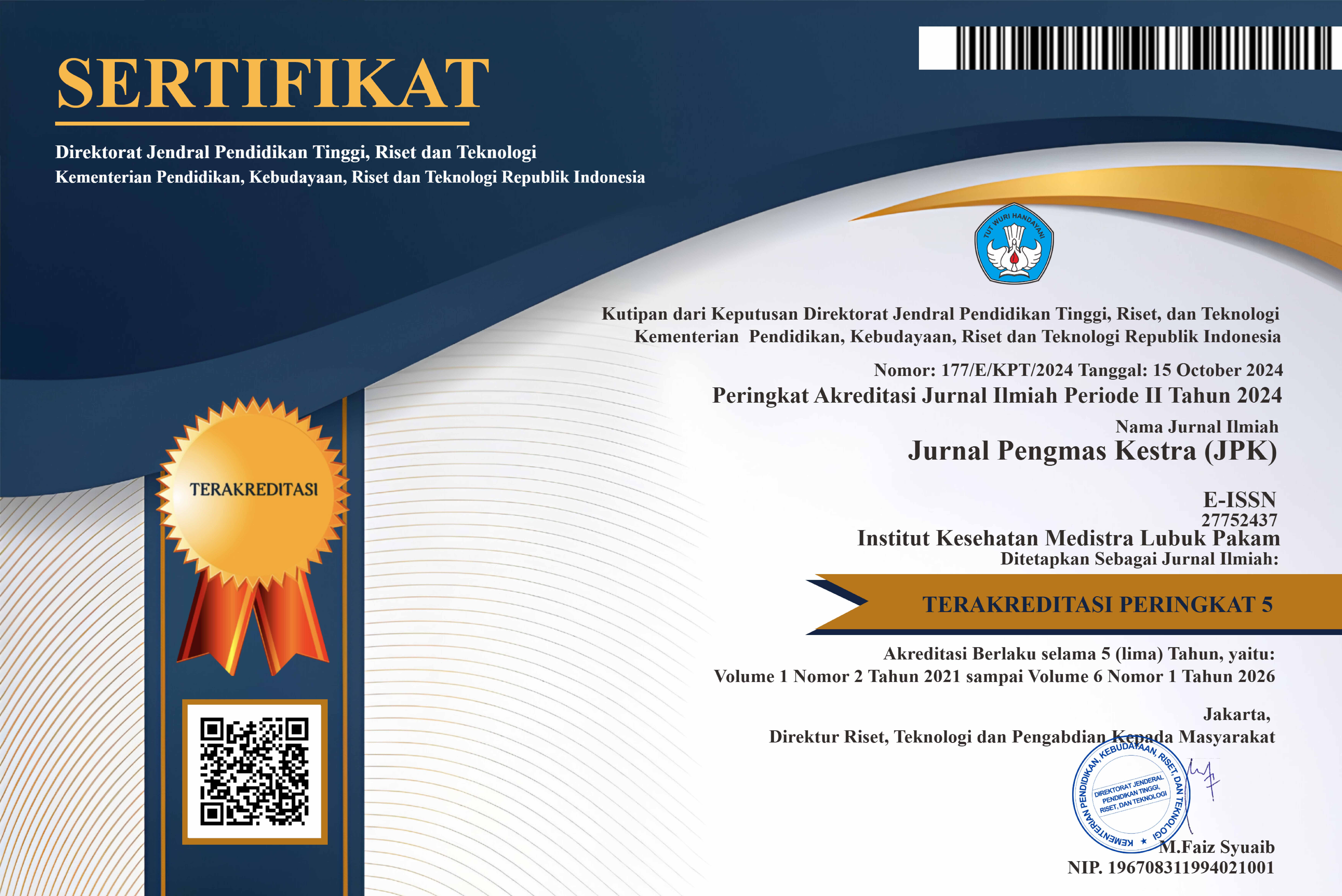Socialization to Mothers Regarding Tummy Time and Normal Baby Gross Motor Development in Pagar Jati’s Puskesmas
DOI:
https://doi.org/10.35451/jpk.v3i2.2002Keywords:
Baby, Mother, Gross Motor Development, Socialization, Tummy TimeAbstract
Adolescence is a period when a person experiences a transition from child to adult which The incidence of delayed child development in Indonesia is 10%. This delay in growth and development is related to the baby's brain development, such as genetic factors, health and nutritional status, the quality of interaction between mother and child, and environmental conditions. Baby's motor development is a phase of baby's development according to age. The child's limited time in motor learning and excessive parental attention as well as low child motivation and stimulation are the triggers for delays. Tummy time is a type of stimulant that influences the motor development of newborn babies. Tummy time is useful in improving the baby's development in positions such as lying on his stomach or back, rolling over, crawling, and preventing brachycephaly. PkM activities were carried out at the Pagar Jati Community Health Center where the PkM participants were mothers with toddlers who were determined using a total sampling method of 15 people. Implementation of PkM is carried out through socialization, demonstrations, discussions and questions and answers. To measure the initial knowledge and increase in knowledge of PkM participants before and after implementing PkM, pre and post-tests will be given. The PkM results show that Tummy time can influence the gross motor development of normal babies with a correlation value of 0.932 and a significance of 0.000. The average pre-test score for PkM participants was 5.6 and post-test was 7.7. If the differences are calculated, an average score increase of 2.1 is obtained, which means that this PkM activity succeeded in increasing the knowledge and abilities of PkM participants regarding tummy time and gross motor development.
References
Hartinger et al. (2017). “Impact of a child stimulation intervention on early child development in rural peru”, J Epidemiol Community Health s And Midwifery Indonesia, hal. 218-224.
Hewitt, L., Kerr, E., Stanley, R. M., & Okely, A. D. (2020). Tummy time and infant health outcomes: a systematic review. Pediatrics, 145(6).
Nursalam,2020. Metodologi Penelitian Ilmu Keperawatan. Pendekatan Praktis. Jakarta: Selemba Medika.
PH, L., Hermanto and Pranita (2019) Karakteristik Orang Tua Dan Perkembangan, Jurnal Kesehatan, 12, pp. 1–13.
Russell, D. et al. (2019) ‘Prone positioning and motor development in the first 6 weeks of life’, South African Journal of Occupational Therapy, 39(1), pp. 11–14.
Sulistyawati, A. 2014. Deteksi Tumbuh Kembang Anak. Jakarta: Salemba Medika.
Widodo, A., Rizky, R., & Waspada, E. (2019). Pengaruh Pemberian Tummy Time Exercise Terhadap Peningkatan Kemampuan Gross Motoric Head Control And Rolling Pada Anak Usia 0-16 Minggu. Proceeding of The URECOL, 11-15.
Downloads
Published
Issue
Section
License
Copyright (c) 2023 Arfah May Syara, Anita Sri Gandaria Purba, Tati Murni Karo-karo, Raynald Ignasius Ginting

This work is licensed under a Creative Commons Attribution 4.0 International License.
Copyright in each article is the property of the Author.




















